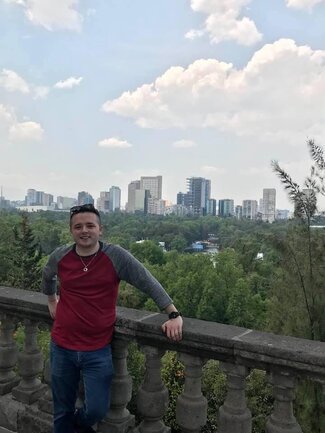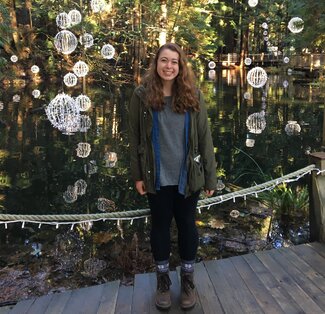Critical thinking skills, complex problem solving, global cultural fluency, creativity, and out-of-the-box thinking. These aren’t just buzzwords- they are the central skills most employers and graduate and professional schools are looking for. Luckily, if you’ve come to anthropology you’ve come to the right place.
What can you do with an Anthropology degree? Just about anything! You gain skills in intercultural competence and communication, hands-on research in lab settings (biological anthropology) and field research (archaeology and linguistic and cultural anthropology); problem-solving skills, and more. Anthropologists, including our majors, go on to medical school, graduate programs, law, public health, criminal justice and forensics, cultural resource management, technology, design and marketing, museums, biotech, environmental management, human resources, international development, and community organizing.
Interested in the competitive world of computer science and user-experience (UX)? Anthropology gives you an edge.
Check out Journalist and Editor Gillian Tet of the Financial Times Who Credits Anthropology for her award-winning journalism!
Are you Pre-Med?
Anthropology sets you apart and prepares you for the challenges ahead: The combination of social and biological sciences that are unique to an Anthropology major can give you an edge on the MCAT and in the competitive worlds of medical research and public health. The combination of anthropology and medicine can even help you change the world.
Interested in Legal Careers?
Anthropology is an excellent choice for students interested in careers in law and International Development, as UIUC Alum Batamaka Some can tell you!
Other resources on careers in Anthropology:
Undegraduate Alumni
Dylan, Class of 2020
Focus: Sociocultural and Linguistic Anthropology
Current job and career goals
I was working for the embassy of Bahrain for a few months since I have moved to Washington DC as a Research Analyst. Though I have received a new job offer, working for the Department of Defense as a translator with a specialty on Mexican Spanish and dialects (I was a Rotary Exchange Student to Veracruz 2013-2014, where I became fluent with the native accent as well). I am interested in getting my PhD, and applying for the Fulbright program next year to continue my education. If I do not go into the Fulbright program, then I would like to go into Foreign Service. My interests are mostly involved with indigenous communities within Mexico (specifically Veracruz state, Chiapas, and Mexico City).
What do you most appreciate about your anthropology training?
Honestly, the professors office hours, their outside time they also take for their students outside of their office hours. Not having a proper graduation [due to the pandemic] made that a bit hard to come to terms with, I sincerely wish that I could have gotten to brush up on my contacts with them all. Because of anthropology I see many things have become interconnected worldwide. I believe that the past deeply impacts the future. Before my studies in anthropology I already thought this, but the department and the degree has taught me how to see such things in a more visceral and applicable way.
Advice to Majors
Anthropology at the University of Illinois Champaign-Urbana is a great department. I never felt that I could never ask a question or approach any of my professors/grad students. We are all curious of the world around that, that is very obvious. And I think that anyone is interested in politics, culture, language, history, architecture, and so much more can find a way to encompass all of these with anthropology. Of course you have to find a focus, but that is what the faculty is GREAT with doing for the students if they are truly curious.
Sharajonnie, Class of 2019
Focus: Biological Anthropology with a focus on Human Evolutionary Biology
Current job and career goals
Currently, I am completing a masters in law (MSL) at Northwestern University and will matriculating to the University of California at Berkeley, where I will be completing a doctoral degree (PhD) in Integrative Biology. I am broadly interested in understanding co-evolutionary dynamics, anthropogenic climate changes,and their influences on biodiversity. I can attribute my interest in evolution to such courses as Human Biological Variation, which was taught by Dr. Lyle Konigsberg at the time. I also took a Functional Genomics (a 499 course) with Jessica Brinkworth.
What do you most appreciate about your anthropology training?
Having studied anthropology (and currently law), I am now more attuned with the cultural and systematic mechanisms of oppression that were created/influenced by European colonization, and how to combat them. Prospectively, my knowledge of evolution will likely influence my research regarding biodiversity and, potentially, the socio-cultural implications thereof. As a BIPOC woman, I have valued learning the history of anthropology and continued advancements toward decolonization of the sciences. As the socio-cultural climate of the US and abroad continues to evolve, we must be ever-mindful of enslavement, genocide, chicanery, marauding, and other means of oppression and subjugation that have resulted in Eurocentric mentalities and curricula.
Advice to Majors
I advise current and prospective students to use their knowledge to create positive social change!
Nick, Class of 2018
Focus: Sociocultural and Linguistic Anthropology
Current job and career goals
I am currently teaching at an international school in Myanmar. I originally became interested in Myanmar after being invited to serve there as a Peace Corps Volunteer. My time with the Peace Corps was cut short due to the COVID-19, but I have found teaching at my current school to be an excellent place to continue learning about Myanmar. Currently, my interests are to continue working in Myanmar in order to develop a deeper understanding for the country and the many different people living there. My Anthropology training absolutely contributed to my desire to understand the different ways people see and navigate the world.
Hands-on Experience as a Major
Working on my capstone project and everything that went into it: the field research, working on it with Dr. Moodie, and finally presenting it alongside my peers at the Capstone Conference.
What do you most appreciate about your anthropology training?
What I value most about my Anthropology courses is that they have helped me to appreciate cultural differences rather than be frustrated by them. This in turn has allowed me to develop some really meaningful relationships with people from diverse backgrounds.
The perspective I gained from Anthropology has been really important for my current work. Working in a country like Myanmar, which has very different norms and values compared to the United States, it is really important to be able to adapt to the local culture in order to be effective at my job. Being culturally competent is important for gaining the trust of the community that is trusting me to educate their children. Cultural competence is also important when I am creating lessons because I need to make these lessons relevant to my students.
Advice to Majors
My best advice would be to get involved with something you care about and you can really invest your time and energy in. This could be an RSO, internships, volunteer work, or anything really. For me this has been the best way to make connections and open the door to new opportunities and experiences.
Emily, Class of 2018
Focus: Double major in Anthropology and Integrative Biology
Current job and career goals
I just wrapped up my M.S. in Plant, Insect, and Microbial Sciences from the University of Missouri, and am starting up my PhD program at the University of Minnesota studying entomology. More specifically, I am focusing on how climate change (extended summers) influence forest insect development. Faster development can lead to increased insect outbreaks with large-scale environmental impacts. My career goals are currently wide and range from teaching biology at a small university, working for the forest service, or working in museum collections. I currently study entomology (insects), which seems outside of the realm of anthropology, but through my time in the department, I learned many things that have helped me in teaching, working with museum specimens, and framing educational outreach work in an inclusive manner.
Hands-on Experience as a Major
I interned with the entomology department at the Smithsonian's National Museum of Natural History.
What do you most appreciate about your anthropology training?
Anthropology has allowed me to think about my audience more effectively in teaching scenarios. Additionally, it has shaped me into being more conscious of social justice issues in a lasting way, influencing courses I am integrating into my graduate schedule, such as environmental justice classes. I value the variety of experiences and discussions that were available. I could work in a lab helping process artifacts from Cahokia Mounds, I could take a forensic anthropology course, I could go to lunch and chat with visiting alumni such as Dr. Donald Johanson (who's team helped find the Lucy fossil), or chat with professors about social stigmas associated with insects. These are all opportunities that still influence my perspectives and have widened my world views.
Advice to Majors
I would advise getting involved. I didn't branch out and get to know people within the department until later into my program. I wish that I would have spent more time chatting with faculty and working in labs within the department early on. Everyone is very supportive and happy to help guide you and prepare you for a future career, no matter your interest.

